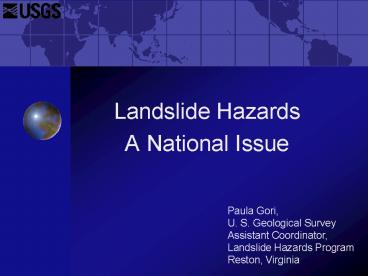Landslide Hazards - PowerPoint PPT Presentation
1 / 22
Title: Landslide Hazards
1
- Landslide Hazards
- A National Issue
Paula Gori, U. S. Geological Survey Assistant
Coordinator, Landslide Hazards Program Reston,
Virginia
2
Property loss grows annually
- Some of the most costly landslides in the US have
been during El Nino related storms in 1883-84 and
1998. - The Nisqually earthquake in Seattle in 2000
caused 30 mil. in damage from landslides.
3
Landslides result in deaths and injuries
- A massive landslide in 1985 in Puerto Rico killed
129 people. - Many of the deaths resulting from Hurricane
Camille in 1969 were caused by debris flows.
4
The presentation will address
- The roles of Federal, State, and Local
governments and the private sector in reducing
losses from landslides. - The American Planning/USGS project to increase
aware and understand of landslide hazards by the
planning community.
5
The presentation will address (cont.)
- The resources that land-use planners can utilize
now to reduce landslide hazards. - The plans for next years APA conference in
Denver, Colorado, on landslide hazards.
6
Landslide Hazards are a National Issue
- Because landslide hazards cross many
jurisdictional lines, no single state or local
jurisdiction can muster the resources necessary
to deal with landslide hazards. - Because landslide hazards, like earthquakes and
volcanoes, occur infrequently and are costly to
mitigate.
7
The U.S. Geological Surveys Role
- The USGS is responsible for providing impartial
earth science information to public officials and
others. - The Stafford Act (1974 Disaster Relief Act) gives
the USGS the responsibility to issue disaster
warnings. - The USGS is the recognized authority on landslide
hazards in the U.S.
8
The Federal Role Focuses on
- Research
- Training
- Information Dissemination
- Regional Assessments
- Development of new technology and methodology,
and modeling - Warning and Prediction
9
The USGS Landslide Hazards Program
- Investigates landslide hazards caused by
earthquakes, volcanoes, hurricanes, floods and
wildfires. - Characterizes landslide processes.
- Monitors and forecasts potential landslides.
- Responds to landslide emergencies and disaster
nationwide and internationally. - Provides timely information through the National
Landslide Information Center.
10
The Role of FEMA
- Responsible for emergency management and
long-term mitigation of natural hazards including
landslides. - Coordinates emergency response, disaster
recovery, and hazard mitigation efforts. - Federal Insurance and Mitigation Administration
provides insurance coverage for flood damages
including mudslides.
11
The Roles of Other Federal Agencies
- The National Science Foundation and the NASA fund
landslide hazard research through universities. - The National Weather Service provides weather
forecasts and assists in emergency response
activities.
12
The Role of Other Federal Agencies (cont.)
- The following agencies manage large land holdings
and infrastructure and play a role in landslide
hazard reduction - U.S. Army Corps of Engineers
- Bureau of Land Management
- U.S. Forest Service
- National Park Service
- Department of Transportation
- Bureau of Reclamation
13
The Role of the States
- States vary in their approach to managing
landslide hazards--Only a few states have
regulatory authority for landslide hazards. - Some state geological surveys produce inventories
and maps of landslides and landslide-prone areas. - Some states also monitor landslide-prone areas
and support research. - States support response and recovery efforts
following landslides.
14
The Role of Local Governments
- The reduction of landslide losses through sound
land-use planning and building, grading and
zoning codes is a local government
responsibility. - Regulatory approaches vary widely.
- In times of disaster, local governments have the
responsibility for issuing landslide warnings and
managing the emergency response unless it
declared a a state or national emergency.
15
The Role of the Private Sector
- Private sector geologists, planners, and
engineers work mainly as consultants for both
local governments and private property owners by
investigating landslide hazard areas and
recommending hazard reduction measures. - Faculty and researchers at universities conduct
research on landslide processes, develop
monitoring and mitigation techniques and advance
scientific methods to understand the hazard.
16
The Role of Professional Societies
- Serve as conduits of information between
researchers and practitioners. - Promote best practices, model codes, guidebooks
and training. - The APA, American Society of Engineers, and
Association of Engineering Geologists serve these
functions for landslide hazard issues.
17
Landslide Hazards and Planning Project
- The main goal of the USGS/APA project is to
educate the planning community on landslide
hazards and how to reduce their impacts on
communities and individuals.
18
USGS/APA Project Outcomes
- The USGS and the APA will publish a practical
guidebook for planners entitled Landslide
Hazards and Planning in the spring of 2003. - The two organizations are also collaborating on
training and workshops for local planners and
curriculum for planning schools. - APA maintains a web site on landslide hazards
http//planning.org/landslide.
www.planning.org/Landslides
19
Other Products and Activities
- APA maintains an electronic mailing list of
interested planners - http//list.planning.org/mailman/listinfo/landslid
es-1 - Referral service
- APA member newsletters, journals articles and
CD-ROMs
www.planning.org/Landslides
20
Guidebook Contents
- Overview of landslide hazards in the US
- Incorporating landslide issues into the planning
process - Regulatory Tools
- Case Studies
- GIS Tools
- Recommendations
- Appendices Model Ordinances
21
Available Resources for Planners
- State Geological Surveys
- National Landslide Information Center at
- www.landslides.usgs.gov
- University planning, geology and engineering
departments
www.landslides.usgs.gov
22
Planning for 2003 APA Conference
- Roll out of the Handbook.
- Session on experiences with landslide hazard
planning and disasters. - Session for Federal government planners.
- GIS and computer-based training.
- Mobile workshops to landslides near Denver.































